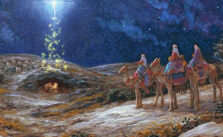My dear brothers, the presence of three gifts at Christ’s manger is no mere coincidence. While there could have been more or less, there were precisely three. Is this a reflection of the Most Holy Trinity’s essence, a foreshadowing of Christ’s threefold ministry—prophetic, priestly, and royal; or perhaps a representation of the tripartite nature of humanity: spirit, soul, and body? These are inquiries left for your faith and comprehension.
Let us now turn our attention to the significant  Worship of the True God: The Story of the Three Median Magi. Led by the light of an extraordinary star, the Magi felt a call to something wondrous and unimaginable. Within these ancient faith’s servants, a flame of spiritual aspiration burned—not of material origin, but a fervent desire that propelled them onward.
Worship of the True God: The Story of the Three Median Magi. Led by the light of an extraordinary star, the Magi felt a call to something wondrous and unimaginable. Within these ancient faith’s servants, a flame of spiritual aspiration burned—not of material origin, but a fervent desire that propelled them onward.
These Magi, adventurers from the east, symbolically exemplify humanity at Christ’s manger; their gifts embody the variety of offerings we, as followers of Christ, can present to our Savior. In this context, the gold signifies material offerings; frankincense represents spiritual, intangible contributions; and myrrh symbolizes gifts that are, in essence, a blend of spiritual and material.
Thus, there are individuals who present gold to the Lord, others who offer frankincense, some who bring myrrh, and still others who combine multiple gifts. Who are these individuals? Reflecting on this will help us understand how we can serve our Lord and Savior, just as the Magi did. So who brings gold to the Lord? It is those who willingly sacrifice portions of their labor and earnings for God’s glory and the aid of their neighbors. For instance, if you’ve constructed, restored, or beautified a church, you’ve offered gold to the Lord. Your contribution delights Him; for though He reigns in glory now, He continues to manifest in the manger for our salvation to this day. This manger exists on the table of oblation within the church, where we might say He is again as if reborn during every Liturgy, offering Himself for our sins. And how often does He experience need in this manger! He desires clothing and shelter, light and warmth. Therefore, when you act for the Church’s benefit, your offering pleases the Lord just as much as the gifts of the Magi who contributed gold.
Likewise, if you have aided suffering humankind, taken initiative for the benefit of the sick, orphaned, strangers, or vulnerable individuals, you have provided gold to the Lord. His love is so profound that He identifies with the needs and struggles of those who trust in His name, thus rewarding the aid provided to them as if it were directed towards Himself. Inasmuch as ye have done it unto one of the least of these My brethren, ye have done it unto Me (Mt. 25:40)—this is the declaration He will make at the Last Judgment to those who have shown mercy to the impoverished.
Are we offering a significant amount of gold to the Lord? Unfortunately, when we compare our offerings to what we expend on our passions and whims—sometimes prioritizing personal desires over genuine needs—it appears to be a mere fraction. The church calls out day and night for aid while we often choose to build grand stables for our livestock instead. A destitute person stands before us trembling with cold, hunger, and sickness; we either harshly deny them or extend only meager assistance. Yet on the same day, we are prepared to waste half our wealth on trifles or generously treat ourselves at spectacles. Such is our gratitude towards Him Who was rich, yet for your sakes became poor, that ye through His poverty might be rich (2 Cor. 8:9).
Who then brings the Lord frankincense? Those who dedicate their abilities, knowledge, and talents for His glory and the benefit of their fellow beings—gifts that gold cannot procure. These are divine offers to mankind, which should also be presented back to God, consisting of immaterial offerings that surpass gold and silver.
A city leader offers frankincense to the Lord when their governance embodies Christ’s spirit, not just seeking civil justice and tranquility, but also fostering good morals and Christian virtues among the populace. Such leadership is like fragrant frankincense before both God and man.
A pastor presents the Lord with frankincense by diligently guarding hearts and souls against the deceptions and temptations of the times, faithfully proclaiming the Lord’s ways, directing the lost, comforting the despairing, and nurturing all.
A mother contributes frankincense to the Lord when she dedicates her time and efforts to raising her children in God’s reverence, instilling qualities of temperance, humility, prayer, and kindness, without relying on hired help or succumbing to distractions. The sweet aroma from this frankincense pervades the entire home, extending its influence through all who are nurtured within it.
An artist offers frankincense to the Lord when, rather than succumbing to the spirit of the times and indulging in base artistic passions, he endeavors to shape his works into vessels of true Christian beauty and grace, spreading goodness and truth through his creations. This sacrificial fragrance touches many lives. In essence, since every individual possesses some ability, every person is able to offer frankincense to the Lord by channeling their talents for God’s glory and the genuine well-being of their neighbors.
The third gift presented to the Lord by the Magi was myrrh—the last gift, surpassing not only gold but also frankincense in importance. What does this gift signify, and why is it so vital? Myrrh, like frankincense, has a sweet aroma, yet its unique characteristic is bitterness, symbolizing our adversities, sorrows, tears, and tribulations. It becomes clear who brings the gift of myrrh to the Lord—it is bestowed by those who endure life’s hardships and suffer innocently, refusing to succumb to despair, despondency, or inconsolable mourning. It’s given by those who, while facing trials, remain filled with hope in the living God, understanding that their sufferings purify sins and elevate them in virtue, ultimately allowing them to mirror their Savior Who died on the Cross for them. Such patient endurance amid tribulations and life’s sorrows is a gift to the Lord, more precious than gold, and more fragrant than frankincense.
Let all who suffer heed this; may they recognize the value in their seemingly bitter circumstances, which, when viewed through the lens of faith and the Cross of Christ, contain sweetness. They should joyfully offer their myrrh as a gift to the Lord. Those who seem fortunate in this life lack the bitter trials and shortcomings that produce myrrh. Similarly, many with impressive gifts, or frankincense, lack the burden of heavy trials; they do not bear the myrrh.
You, who bear the burdens of existence in a wordless manner, possess myrrh; you who, through no fault of your own—some through congenital conditions, others through circumstances, human malice, or even the fraility of the human frame—meet each day with sighs, perhaps even marking Christ’s feast with tears this morning. Those observing you may pity your plight; you may at times falter under the weight of earthly trials. But we, in our Savior’s name, greet you with the reflection of His Cross, urging you to embrace hope.
Preserve the treasured myrrh that has been allocated to you; do not trade it for any frankincense, let alone any gold, and refrain from diminishing its beauty due to complaints and discouragement. Why lament? The Lord perceives everything, needing no signal. Every tear you shed is noted, each sigh you breathe weighed by Him, and will be recompensed abundantly in due time.
Amen.

